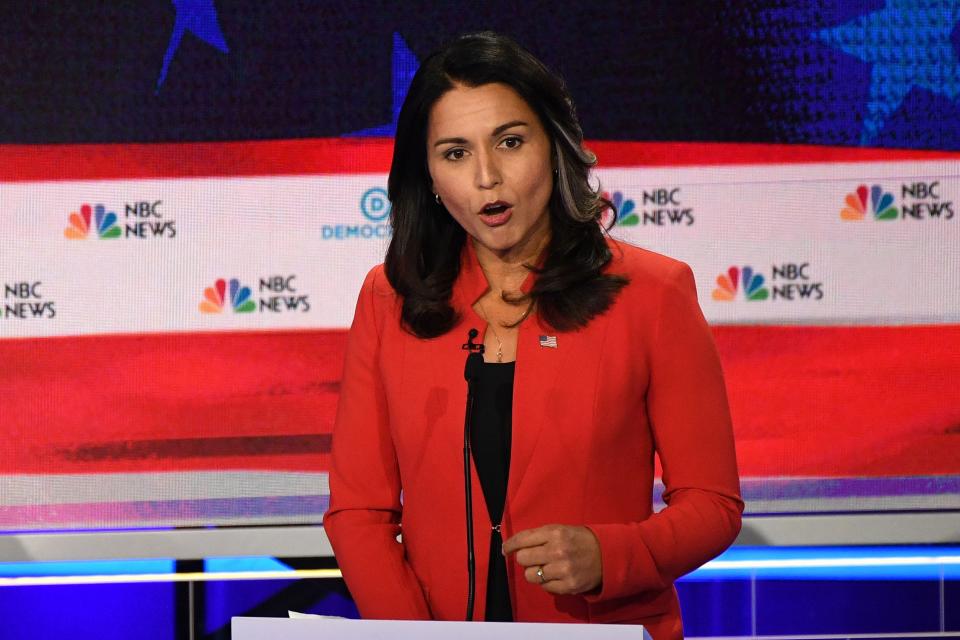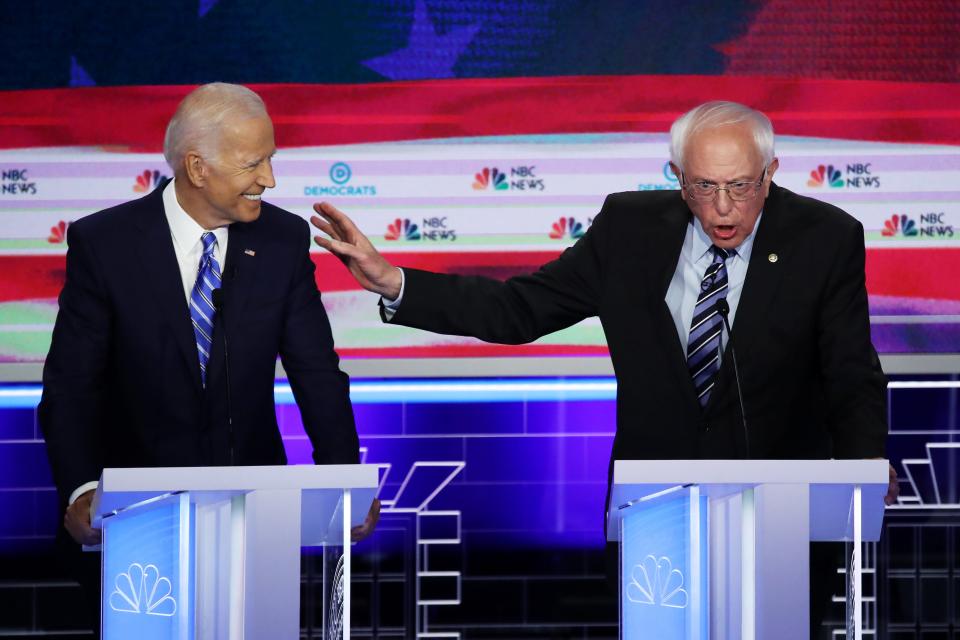The winners and losers from 2 nights of sparring at the Democratic debates in Miami
The first debate among the Democrats eager to take on President Donald Trump is done.
The two-day audition to be the party's nominee in 2020 were shaped by policy disagreements, generational contrasts and gender divides.
There were candidates talking over each other, technical difficulties, and even an odd fashion choice.
Here are the winners and losers of the debate:
Winners:
Sen. Kamala Harris:
Harris took advantage of the opportunity a to be among the randomly chosen group of 10 that included frontrunner Joe Biden on Thursday.
Sharing the stage with the former vice president meant she was able to go after him on busing and racial issues – and make a mark.
Biden watched stone-faced as the California Democrat swiped at him. Harris gave Biden a chance to reply, saying "Do you agree today that you were wrong to oppose busing in America?"
The former vice president got defensive and forcefully denied that he opposed busing. Instead, he said he had opposed the federal implementation of that policy and the imposition of it on local communities that did not want it.
Biden busing: Biden has opposed busing children to integrate schools. It's been a complicated and controversial position
Personal moment: 'That little girl is me': Harris challenges Biden in key debate moment. Here are 4 other takeaways
But Harris stood her ground and argued that preferences like that on the part of state and local governments were failures in the country's quest for racial justice and that's exactly why the federal government needed to step in.
But she wasn't just tough. She also played peacemaker at one point when candidates started talking over one another in chaotic fashion.
"Hey guys, you know what, America does not want to witness a food fight," Harris said. "They want to know how we're going to put food on their table."
Undocumented Immigrants
Over two nights, the candidates universally blasted Trump's persistent efforts to expand the wall on the southern border, detain immigrants crossing in from Mexico and separate children from parents as inhumane and un-American.
Their collective response: We will welcome those trying to start a better life in the United States.
Democrats explained how they would introduce benefits for the millions of undocumented immigrants currently living in the country.
Most of the presidential candidates said they would include health insurance coverage for undocumented immigrants in their health care plans and proposals.
Harris also said on her first day in office she would make sure beneficiaries of the Deferred Action for Childhood Arrivals program — undocumented immigrants who came to the United States as children, often referred to as "Dreamers" — are protected. She added that she would make sure their families are as well.
On Wednesday night, former Housing and Urban Development Secretary Julián Castro posed a question: Would his fellow candidates join him in calling for the repeal of the federal law that makes illegal entry into the country a misdemeanor? (Instead, Castro argued, entering the country illegally should be a civil violation, rather than a criminal one.)
Many of the candidates during Thursday night's debate answered Castro's challenge from the night before by saying yes, they would decriminalize illegal entry into the U.S.
Women:
The six female candidates were prepared with specific proposals and sharp counterpoints during both nights.
Massachusetts Sen. Elizabeth Warren came with her detailed policy plans. New York Sen. Kirsten Gillibrand pointed out how she had helped to write key provisions of health care reform.
When Washington Gov. Jay Inslee tried to position himself as the leading candidate on protecting reproductive rights, Minnesota Sen. Amy Klobuchar wouldn't let that go unchallenged.
"I just want to say, there's three women up here that have fought pretty hard for a woman's right to choose," she told Inslee during Wednesday's debate. "I'll start with that.

And it was Hawaii Rep. Tulsi Gabbard of Hawaii who corrected Ohio Rep. Tim Ryan's mistaken claim that it was Al-Qaeda, not the Taliban, who masterminded the 9-11 attacks.
Donald Trump
In typical Trumpian fashion, the president declared himself the winner of the debate. But he's got a point.
Following months of a largely unified effort by the opposition to go after the president, Democrats helped his cause by chirping at each other and exposing policy and personality rifts while millions watched.
The digs at Biden alone will help Trump, who trailed the former vice president in recent polls, including Florida, by sizable margins.
Even while he was in Japan on official business with world leaders, Trump blasted Democrats for universally pledging their health care proposals would provide coverage for immigrants in the country illegally.
"All Democrats just raised their hands for giving millions of illegal aliens unlimited healthcare. How about taking care of American Citizens first!?" Trump posted on Twitter in between meetings with other world leaders. "That’s the end of that race!"
And he was able to taunt the opposition by describing the debate with what he would consider the ultimate putdown: “BORING!”
Losers:
The Old Guard
Biden and Vermont Sen. Bernie Sanders came into the debates among the clear front-runners.
They might still be leading the pack after the Miami debates but they looked stale and old at times compared to younger, more energetic rivals.
Nowhere was that clearer as when Rep. Eric Swalwell of California told Biden during Thursday's debate that "it's time to pass the torch to a new generation of Americans."

Swalwell, 38, targeted Biden, 76, reminding him of a moment from nearly three decades ago when Biden called for a new generation to lead the nation.
"I was 6-years-old when a presidential candidate came to the California Democratic Convention and said it's time to pass the torch to a new generation of Americans," Swalwell said. "That candidate was then-Sen. Joe Biden."
Sanders, 77, continued his Democratic Socialist assault on Wall Street and other corporate institutions but his pitch lacked some of the edge from three years ago, when he was the clear alternative to Hillary Clinton. The party has drifted left since 2016 thanks in part to Sanders. He came off Thursday as part of the crowd rather than as a someone dispensing fresh ideas.
Even Warren at times looked out-muscled, especially in the second half of Wednesday's debate when she was barely called on by the moderators.
Former Rep. Beto O'Rourke
O'Rourke gained a national following as he ran for Senate against Sen. Ted Cruz, R-Texas, during the 2018 midterms — a campaign he went on to lose.
After announcing his presidential candidacy in March, his polling numbers ticked up and at that time, he had the largest first-day fundraising of any Democratic 2020 candidate. Since then, however, O'Rourke's candidacy has plateaued, amid questions about whether the former Texas congressman lacks detailed policy proposals on key issues.
Trump taunt: Donald Trump declares a winner of the Democratic debates ... himself
Resetting the race: Biden's image as the inevitable nominee, the one to beat Trump, was dinged Thursday
And on Wednesday night, O'Rourke lacked substance in his answers. He failed to give a concrete answer to the first question directed to him, despite making waves by answering that question partly in Spanish.
Throughout the night, he also didn't give detailed responses at some points.
Marginal candidates
They came up with some of the best zingers and helped shape the tone of the debate, but many of the candidates hovering around 1% in the polls probably didn't do much to improve their chances.
Most of them hardly got to speak, according to an analysis by the number-crunching web site 538.
And they might be most remembered for viral moments: Andrew Yang going on stage tie-less, Marianne Williamson promising to call New Zealand for guidance, and Ohio Rep. Tim Ryan misidentifying the 9/11 terrorists.
Did they do enough to stay on stage for the next debate considering a group of others who just missed the cut – including Montana Gov. Steve Bullock and Massachusetts Rep. Seth Moulton – will be trying to replace them?
Climate change
While most candidates embraced the need to address climate change aggressively, the topic barely came up as part of a detailed policy discussion.
Instead, it was given light treatment: Candidates raised their hands if they thought it a major issue, or mentioned it when moderators wanted to get quick responses to a major issue they would tackle if elected.
Inslee, who has built his campaign around a platform to combat global warming, was barely heard. At 875 words, he spoke less than every candidate other than Yang.
Barely getting a mention was the Green New Deal, the blueprint drawn up by New York Rep. Alexandria Ocasio-Cortez and other progressives on Capitol Hill.
Contributing: John Fritze
This article originally appeared on USA TODAY: The winners and losers from 2 nights of sparring at the Democratic debates in Miami

